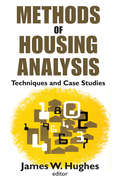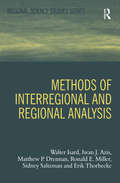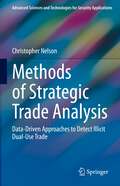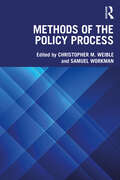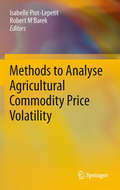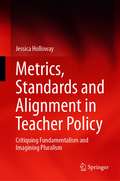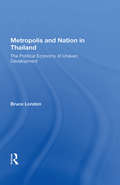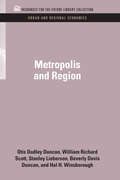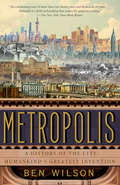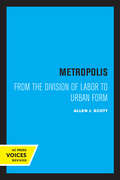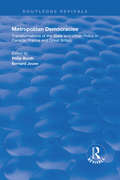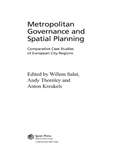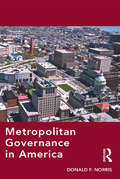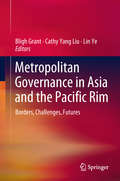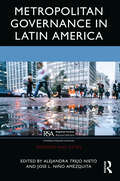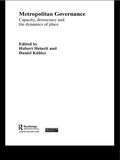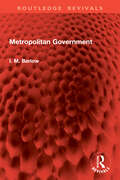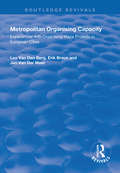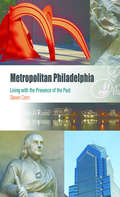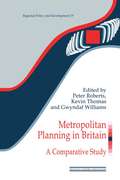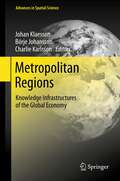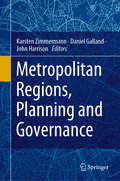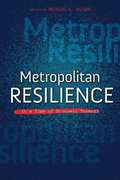- Table View
- List View
Methods of Housing Analysis: Techniques and Case Studies
by A. James GregorIn order to understand and formulate housing policy and programs, it is necessary to have a working knowledge of the internal economic operation of housing from the points of view of both the investor and the owner. James W. Hughes argues that investors' and owners' behavior and activity tend to be governed by market forces and other realities. In that regard, he begins this work by analyzing market rates of return in real estate and housing undertakings, and the variety of analytical techniques which underlie their determination.Methods of Housing Analysis is designed to provide urban planners with an introduction to the basic, quantitative techniques associated with the analysis of housing. A myriad of specific analytical methods has evolved in each of the professions concerned with this subject area. Planners, investors, developers, engineers, appraisers, social scientists, and governmental officials all tend to exhibit unique perspectives when examining housing and have developed their analytical frameworks accordingly.The work is comprised of an extensive discussion by the author, detailed case studies and examples, and a number of essays by leading experts that detail specific analytical procedures and demonstrate their use. The book is divided into four major sections: analysis of the internal operation of housing; basic cost-revenue analysis; expanded cost-revenue/benefit analysis; and government regulation of housing. The thorough nature of Hughes' discussion and of the related readings makes this volume an ideal textbook and reference source.
Methods of Interregional and Regional Analysis
by Erik Thorbecke Ronald E. Miller Matthew P. Drennan Iwan J. Azis Sidney Saltzman Walter IsardThis landmark textbook introduces students to the principles of regional science and focuses on the key methods used in regional analysis, including regional and interregional input-output analysis, econometrics (regional and spatial), programming and industrial and urban complex analysis, gravity and spatial interaction models, SAM and social accounting (welfare) analysis and applied general interregional equilibrium models. The coherent development of the materials contained in the set of chapters provides students with a comprehensive background and understanding of how to investigate key regional problems. For the research scholar, this publication constitutes an up-to-date source book of the basic elements of each major regional science technique. More significant, it points to new directions for future research and ways interregional and regional analytic approaches can be fused to realise much more probing attacks on regional and spatial problems - a contribution far beyond what is available in the literature.
Methods of Strategic Trade Analysis: Data-Driven Approaches to Detect Illicit Dual-Use Trade (Advanced Sciences and Technologies for Security Applications)
by Christopher NelsonThis book addresses ways that governments, international organizations, and other stakeholders can utilize data to uncover illicit trade in materials and equipment that could be used to support chemical, biological, nuclear, and advanced conventional weapons systems. Key concepts of strategic trade are introduced, including examples of strategic goods and their potential uses in weapons of mass destruction (WMDs) and weapons systems, the interplay between the Harmonized System and strategic trade control regimes, and the data available for analysis in the field. Innovative, yet practical methodologies to analyze strategic trade cover the use of crime scripts, risk assessment indicators, mirror statistics, market share analysis, and transshipment and re-export analysis. There are also chapters on leading-edge techniques involving machine learning and network analysis that have shown promise in other areas of crime and illicit trade investigations. Each chapter provides step-by-step instructions on applying the technique, numerous case studies and examples, and discussions of the strengths and weaknesses of each approach. This volume is designed to provide all types of analysts with practical pathways for understanding, detecting, and disrupting illicit procurement of materials and equipment needed to produce WMDs and advanced weapons.
Methods of the Policy Process
by Christopher M. WeibleThe increasingly global study of policy processes faces challenges with scholars applying theories in radically different national and cultural contexts. Questions frequently arise about how to conduct policy process research comparatively and among this global community of scholars. Methods of the Policy Process is the first book to remedy this situation, not by establishing an orthodoxy or imposing upon the policy process community a rigid way of conducting research but, instead, by allowing the leading researchers in the different theoretical traditions a space to share the means by which they put their research into action. This edited volume serves as a companion volume and supplemental guide to the well-established Theories of the Policy Process, 4th Edition. Methods of the Policy Process acknowledges that growth and advancement in the study of the policy process is dependent not merely on conceptual and theoretical development, but also on developing and systematizing better methodological approaches to measurement and analysis. To maximize student engagement with the material, each chapter follows a similar framework: introduction of a given theory of the policy process, application of that theory (including best practices for research design, conceptualization, major data sources, data collection, and methodological approaches), critical assessment, future directions, and often online resources (including datasets, survey instruments, and interview and coding protocols). While the structure and focus of each chapter varies slightly according to the theoretical tradition being discussed, each chapter's central aim is to prepare readers to confidently undertake common methodological strategies themselves. Methods of the Policy Process is especially beneficial to people new to the field, including students enrolled in policy process courses, as well as those without access to formal training. For scholars experienced in applying theories, this edited volume is a helpful reference to clarify best practices in research methods.
Methods of the Policy Process
by Christopher M. WeibleThe increasingly global study of policy processes faces challenges with scholars applying theories in radically different national and cultural contexts. Questions frequently arise about how to conduct policy process research comparatively and among this global community of scholars. Methods of the Policy Process is the first book to remedy this situation, not by establishing an orthodoxy or imposing upon the policy process community a rigid way of conducting research but, instead, by allowing the leading researchers in the different theoretical traditions a space to share the means by which they put their research into action. This edited volume serves as a companion volume and supplemental guide to the well-established Theories of the Policy Process, 4th Edition. Methods of the Policy Process acknowledges that growth and advancement in the study of the policy process is dependent not merely on conceptual and theoretical development, but also on developing and systematizing better methodological approaches to measurement and analysis. To maximize student engagement with the material, each chapter follows a similar framework: introduction of a given theory of the policy process, application of that theory (including best practices for research design, conceptualization, major data sources, data collection, and methodological approaches), critical assessment, future directions, and often online resources (including datasets, survey instruments, and interview and coding protocols). While the structure and focus of each chapter varies slightly according to the theoretical tradition being discussed, each chapter's central aim is to prepare readers to confidently undertake common methodological strategies themselves. Methods of the Policy Process is especially beneficial to people new to the field, including students enrolled in policy process courses, as well as those without access to formal training. For scholars experienced in applying theories, this edited volume is a helpful reference to clarify best practices in research methods.
Methods to Analyse Agricultural Commodity Price Volatility
by Robert M'Barek Isabelle Piot-LepetitThis book examines the issue of price volatility in agricultural commodities markets and how this phenomenon has evolved in recent years. The factors underlying the price spike of 2007-08 appear to be global and macroeconomic in nature, including the rapid growth in demand by developing countries, the international financial crisis, and exchange rate movements. Some of these factors are new, appearing as influences on price volatility only in the last decade. Although volatility has always been a feature of agricultural commodity markets, the evidence suggests that volatility has increased in certain commodity markets. A growing problem is that agricultural price shocks and volatility disrupt agricultural markets, economic incentives and incomes. With increased globalization and integration of financial and energy markets with agricultural commodity markets, the relationships between markets are expanding and becoming more complex. When a crisis such as a regional drought, food safety scare or a financial crisis hits a particular market, policy-makers often do not know the extent to which it will impact on other markets and affect producer, consumer and trader decisions. Including contributions from experts at the World Bank, the Food and Agriculture Organization of the United Nations, the USDA, and the European Commission, the research developed throughout the chapters of this book is based on current methodologies that can be used to analyze price volatility and provide directions for understanding this volatility and the development of new agricultural policies. The book highlights the challenges facing policy makers in dealing with the changing nature of agricultural commodities markets, and offers recommendations for anticipating price movements and managing their consequences. It will be a practical guide for both present and future policy-makers in deciding on potential price-stabilizing interventions, and will also serve as a useful resource for researchers and students in agricultural economics.
Metrics, Standards and Alignment in Teacher Policy: Critiquing Fundamentalism and Imagining Pluralism
by Jessica HollowayThis book looks at the narrowing effects of contemporary modes of teacher and teaching policy and governance. It draws on political theory to provide new ways of conceptualising the effects of teacher and teaching policies and practices. It adds a new dimension to the robust body of literature related to teacher policy by looking at three interrelated domains: (1) teacher preparation and development, (2) teacher evaluation and (3) teacher leadership.Drawing from case studies from the USA, UK and Australia, it illustrates how a coalescence around metrics, standards and compliance is producing increasingly restricted notions of teachers and teaching. It shows how the rationalities and techniques associated with accountability and standardisation are limiting the possibilities for multiple conceptualisations of teaching and teachers to exist or emerge. Using pluralism as the main framework, it challenges the dangers associated with rigid compliance and alignment and argues that pluralism can help secure schools as socially and culturally responsive to the needs of the community.
Metropolis And Nation In Thailand: The Political Economy Of Uneven Development
by Bruce LondonThis qualitative study of the relationships between one primate city, Bangkok, and its hinterland, the Thai nation, breaks new ground in general sociological theory, redirects the study of city-hinterland relationships, and presents an interpretation of Thai political history that departs significantly from conventional analyses. Professor London f
Metropolis and Region (RFF Urban and Regional Economics Set)
by Stanley Lieberson Otis Dudley Duncan William Richard Scott Beverly Davis Duncan Hal H. WinsboroughThis is Volume II of a series of six on Urban and Regional Economics originally published in 1960. This study discusses the future of urban developments in America. Has they already have megapolitan belts, sprawling regions of quasi-urban settlement stretching along coast lines or major transportation routes, current concepts of the community stand to be challenged. What will remain of local government and institutions if locality ceases to have any historically recognizable form? The situations described in this book pertain to the mid-century United States of some 150 million people. What serviceable image of metropolis and region can we fashion for a country of 300 million? The prospect for such a population size by the end of the twentieth century is implicit in current growth rates, as is the channeling of much of the growth into areas now called metropolitan or in process of transfer to that class.
Metropolis: A History of the City, Humankind's Greatest Invention
by Ben WilsonIn a captivating tour of cities famous and forgotten, acclaimed historian Ben Wilson tells the glorious, millennia-spanning story how urban living sparked humankind's greatest innovations. &“A towering achievement.... Reading this book is like visiting an exhilarating city for the first time—dazzling.&” —The Wall Street JournalDuring the two hundred millennia of humanity&’s existence, nothing has shaped us more profoundly than the city. From their very beginnings, cities created such a flourishing of human endeavor—new professions, new forms of art, worship and trade—that they kick-started civilization. Guiding us through the centuries, Wilson reveals the innovations nurtured by the inimitable energy of human beings together: civics in the agora of Athens, global trade in ninth-century Baghdad, finance in the coffeehouses of London, domestic comforts in the heart of Amsterdam, peacocking in Belle Époque Paris. In the modern age, the skyscrapers of New York City inspired utopian visions of community design, while the trees of twenty-first-century Seattle and Shanghai point to a sustainable future in the age of climate change. Page-turning, irresistible, and rich with engrossing detail, Metropolis is a brilliant demonstration that the story of human civilization is the story of cities.
Metropolis: Bernie Gunther 14 (Bernie Gunther #14)
by Philip KerrBerlin detective Bernie Gunther bows out at last in the 14th and final book of the Sunday Times and New York Times bestselling series. With an introduction by Ian Rankin.'One of the greatest anti-heroes ever written' LEE CHILD'One of the greatest master story-tellers in English' ALAN FURSTBerlin, 1928, the height of the Weimar Republic. Bernie is a young detective working in Vice when he asked to investigate the Silesian Station killings: four prostitutes murdered in as many weeks, and in the same gruesome manner. Bernie hardly has time to acquaint himself with the case files before another murder occurs. Until now, no one has shown much interest in these victims - there are plenty in Berlin who'd like the streets washed clean of such degenerates. But this time the girl's father runs Berlin's foremost criminal ring, and he's prepared to go to extreme lengths to find his daughter's killer. It seems that someone is determined to rid Berlin of anyone less than perfect. The voice of Nazism is becoming a roar that threatens to drown out all others. But not Bernie Gunther's...(P) 2022 Quercus Editions Ltd
Metropolis: From the Division of Labor to Urban Form
by Allen J. ScottHere is an extensive and highly original inquiry into the origins, dynamics, and internal order of the modern metropolis. Allen J. Scott demonstrates how the metropolis emerges out of the basic mechanisms of production and work in contemporary society, and how those mechanisms guide general patterns of urban development. His work will be stimulating to social scientists and to planners and policy makers as well. This title is part of UC Press's Voices Revived program, which commemorates University of California Press’s mission to seek out and cultivate the brightest minds and give them voice, reach, and impact. Drawing on a backlist dating to 1893, Voices Revived makes high-quality, peer-reviewed scholarship accessible once again using print-on-demand technology. This title was originally published in 1988.
Metropolitan Democracies: Transformations of the State and Urban Policy in Canada, France and Great Britain (Routledge Revivals)
by Bernard JouveOriginally published in 2005. Citizen involvement - and the concept of partnership - in urban governance has long been a major issue in the transformation of local democracy. The move from delegated to participative forms of local government has, in principle, profound consequences for governance at the scale of cities. However, it is clear that partnership and participation are interpreted in many different ways, according to the traditions of government in different countries. This volume brings together the experiences of three countries in which very different approaches to participation are evident: Canada, France and the United Kingdom. By comparing and reflecting on these countries' approaches and the resulting changes in governance, it provides an in-depth analysis of the intentions and effects of involving citizens in policy making. It also highlights innovative new forms of partnership which are emerging within metropolitan areas at a local level.
Metropolitan Governance and Spatial Planning: Comparative Case Studies of European City-Regions
by Anton Kreukels Willem Salet Andy ThornleyMetropolitan Governance and Spatial Planning explores the relationship between metropolitan decision-making and strategies to co-ordinate spatial policy. This relationship is examined across 20 cities of Europe and the similarities and differences analysed.Cities are having to formulate their urban policies in a very complex and turbulent environment. They are faced with numerous new pressures and problems and these often create contradictory conditions. The book provides a theoretical framework for exploring these issues and links this to a detailed investigation of each city. In the context of globalisation, cities in the last twenty years have experienced new patterns of activity and these usually transcend political boundaries. The management of these changes therefore requires an effort of co-ordination and different cities have found different approaches.However the institutional setting itself has not remained static. The nation states in Europe have handed over many responsibilities to the European Union while also increasing devolution to regions and cities. Government has therefore become a more complex multi-level activity.There has also been the move from government to governance. Many different public, quasi-public and private bodies are now involved in making decisions that affect urban development. Metropolitan governance is therefore also a complex multi-actor process.In these conditions of fragmented governance and the widening spatial networking of urban development, the issue of policy co-ordination become ever more important. The exploration of the 20 cities shows that many face similar difficulties while some also provide interesting examples of innovative practice. The book concludes that the way forward is to find strategies to link the different spheres of metropolitan action through 'organising connectivity'.
Metropolitan Governance in America (Markets And The Law Ser.)
by Donald F. NorrisMetropolitan government and metropolitan governance have been ongoing issues for more than sixty years in the United States. Based on an extensive survey and a review of existing literature, this book offers a comprehensive overview of these debates. It discusses how the centrifugal forces in local government, and in particular local government autonomy, have produced a highly fragmented governmental landscape throughout America. It argues that in order for 'governance' to occur in metropolitan areas (or anywhere else, for that matter), there has to be some form of an actual governmental institution that possesses the power and ability to compel compliance. Everything else is just some form of cooperation, and while cooperation is not trivial, it does not enable metropolitan areas to address the really tough and controversial issues that divide rather than unite governments in those areas. The book examines the principal factors that prevent the development of either metropolitan government or metropolitan governance in the USA. Norris looks at several examples where some form of metropolitan government or governance can be said to exist, from voluntary cooperation (the weakest) to government (the strongest). He also examines each type of arrangement for its ability to address metropolitan-wide problems and whether each type is or is not in use in the USA. In sum, the book uncovers the extent of metropolitan government and governance, the possibility for its existence, what attempts (if any) have been made in the past, and the problems and issues that have arisen due to the lack of adequate metropolitan governance.
Metropolitan Governance in Asia and the Pacific Rim: Borders, Challenges, Futures
by Bligh Grant Lin Ye Cathy Yang LiuThis edited collection examines seminal changes and major policy challenges in metropolitan governance in Asia and the Pacific Rim that are being faced by governments (national and sub-national) and their polities. The book builds upon the work of the largest stream at the Urban Affairs Association’s (UAA) Annual Conference (Urban Issues in Asia and the Pacific Rim) – specifically, the chapters arose from presentations at the 2016 UAA Annual Conference in San Diego and ensuing discussions and debates. The book is framed by three over-arching narratives:• the increased importance (economic, political and cultural) of the Asian region within strategic discussions of planetary urbanism and the problematisation of the concept of the Asian region as an element of these discussions• the challenges engendered by the rapid pace of development (again, economic, political and cultural) and the endorsement, tacit or otherwise, of developmentalism in many of the polities under consideration• the increased salience of metropolitan and urban areas, vis-à-vis other levels of governance (national; local; supra-national), particularly how it is seen as key in addressing these challenges.
Metropolitan Governance in Latin America (Regions and Cities)
by Alejandra Trejo NietoThis book represents a powerful analysis of the challenges of metropolitan governance in all its messiness and complexity. It examines Latin American metropolitan governance by focusing on the issue of public service provision and comparatively examining five of the largest and most complex urban agglomerations in the region: Buenos Aires, Bogota, Lima, Mexico City and Santiago. The volume identifies and discusses the most pressing challenges associated with metropolitan coordination and the coverage, quality and financial sustainability of service delivery. It also reveals a number of spatial inequalities associated with inadequate provision, which may perpetuate poverty and other inequalities. Metropolitan Governance in Latin America will be valuable reading for advanced students, researchers and policymakers tackling themes of urban planning, spatial inequality, public service provision and Latin American urban development.
Metropolitan Governance in the 21st Century: Capacity, Democracy and the Dynamics of Place (Routledge/ECPR Studies in European Political Science)
by Daniel Kübler Hubert HeineltThis book offers a cross-national analysis of contemporary issues and challenges for the governing of urban regions. The case studies on Germany, Spain, France, Greece, The Netherlands, Finland, the UK, Switzerland, Australia, the US and Canada, place particular emphasis on the tensions building on metropolitan governing capacity and democratic legitimacy. The authors develop and use an analytical framework focused on the dynamics of place and make an original contribution to the debates on the nature of metropolitan governance.
Metropolitan Government (Routledge Revivals)
by I. M. BarlowFirst published in 1991, Metropolitan Government provides an in-depth study of metropolitan government and outlines the need for a unit of government at the metropolitan level. It discusses relevant theoretical aspects of local government reorganization.Developments in metropolitan government in London, Manchester, Melbourne, Toronto, and San Francisco are explored, documenting approximately 100 years of progress. By examining cities in Australia, Britain, Canada, and the United States, the volume provides a good basis for international comparative studies in the field.This book is intended for students and researchers in political geography, political science, policy studies, public administration and urban studies.
Metropolitan Organising Capacity: Experiences with Organising Major Projects in European Cities (Routledge Revivals)
by Erik Braun Leo van Berg Jan van MeerPublished in 1997. The environment of cities has become increasingly competitive. Tradition location factors, that once tied economic activities firmly to particular areas have become less important. Increasingly the ability of a city to anticipate, respond to and cope with internal and external changes is getting attention. Organizing capacity of cities, or of metropolitan regions is becoming indispensible for sustainable economic and social development. The authors have carried out investigations into eight European cities to increase the insight into the practice of organizing capacity. The analysis of the development and implementation of 15 revitalization projects in these cities shows that organizing capacity calls for a new style of entrepreneurial urban management with public and private networking, leadership, long term strategies and organizing political and public support as key concepts.
Metropolitan Philadelphia
by Steven ConnAs America's fifth largest city and fourth largest metropolitan region, Philadelphia is tied to its surrounding counties and suburban neighborhoods. It is this vital relationship, suggests Steven Conn, that will make or break greater Philadelphia.The Philadelphia region has witnessed virtually every major political, economic, and social transformation of American life. Having once been an industrial giant, the region is now struggling to fashion a new identity in a postindustrial world. On the one hand, Center City has been transformed into a vibrant hub with its array of restaurants, shops, cultural venues, and restored public spaces. On the other, unchecked suburban sprawl has generated concerns over rising energy costs and loss of agriculture and open spaces. In the final analysis, the region will need a dynamic central city for its future, while the city will also need a healthy sustainable region for its long-term viability.Central to the identity of a twenty-first century Metropolitan Philadelphia, Conn argues, is the deep and complicated interplay of past and present. Looking at the region through the wide lens of its culture and history, Metropolitan Philadelphia moves seamlessly between past and present. Displaying a specialist's knowledge of the area as well as a deep personal connection to his subject, Conn examines the shifting meaning of the region's history, the utopian impulse behind its founding, the role of the region in creating the American middle class, the regional watershed, and the way art and cultural institutions have given shape to a resident identity.Impressionistic and beautifully written, Metropolitan Philadelphia will be of great interest to urbanists and at the same time accessible to the wider public intrigued in the rich history and cultural dynamics of this fascinating region. What emerges from the book is a wide-ranging understanding of what it means to say, "I'm from Philadelphia."
Metropolitan Planning in Britain: A Comparative Study (Regions and Cities #19)
by Peter Roberts Kevin Thomas Gwyndaf WilliamsMetropolitan Planning in Britain is the first comparative analysis and assessment of metropolitan areas and their strategic planning for almost two decades. Changes in population distribution, styles of local government, business practices, and attitudes to the environment have all had an impact on cities in recent years which planners and other policy makers must take into consideration. Based on a series of research projects and the activities of a study group supported by the Regional Studies Association, the book examines in detail nine major urban areas, their specific characters and requirements, and how metropolitan planning is adapting to fulfil those requirements. It also discuses the possible future evolution of metropolitan planning, especially in the light of new regional arrangements and devolution.
Metropolitan Regions
by Charlie Karlsson Johan Klaesson Börje JohanssonMetropolitan growth has been dramatic in the past several decades, and today metropolitan regions are recognized as the main driving forces in national growth and development as well as in national and global innovation processes. The purpose of this book is to contribute to a better understanding of how metropolitan regions and their subsystems interact and compete, why they differ in their capacity to nurture innovation and growth, and how metropolitan policies must be designed to secure the region's long-term vitality. To that end, it presents new contributions on theories of urban growth, institutions and policies of urban change, and case studies of urban growth prepared by international experts.
Metropolitan Regions, Planning and Governance
by John Harrison Karsten Zimmermann Daniel GallandThe aim of this book is to investigate contemporary processes of metropolitan change and approaches to planning and governing metropolitan regions. To do so, it focuses on four central tenets of metropolitan change in terms of planning and governance: institutional approaches, policy mobilities, spatial imaginaries, and planning styles. The book’s main contribution lies in providing readers with a new conceptual and analytical framework for researching contemporary dynamics in metropolitan regions. It will chiefly benefit researchers and students in planning, urban studies, policy and governance studies, especially those interested in metropolitan regions.The relentless pace of urban change in globalization poses fundamental questions about how to best plan and govern 21st-century metropolitan regions. The problem for metropolitan regions—especially for those with policy and decision-making responsibilities—is a growing recognition that these spaces are typically reliant on inadequate urban-economic infrastructure and fragmented planning and governance arrangements. Moreover, as the demand for more ‘appropriate’—i.e., more flexible, networked and smart—forms of planning and governance increases, new expressions of territorial cooperation and conflict are emerging around issues and agendas of (de-)growth, infrastructure expansion, and the collective provision of services.
Metropolitan Resilience in a Time of Economic Turmoil
by Michael A. PaganoCities, counties, school districts and other local governments have suffered a long-lasting period of fiscal challenges since the beginning of the Great Recession. Metropolitan governments continue to adjust to the "new normal" of sharply lower property values, consumer sales, and personal income. Contributors to this volume include elected officials, academics, key people in city administrations, and other nationally recognized experts who discuss solutions to the urban problems created by the Great Recession. Metropolitan Resilience in a Time of Economic Turmoil looks at the capacity of local governments to mobilize resources efficiently and effectively, as well as the overall effects of the long-term economic downturn on quality of life. Introducing the reader to the fiscal effects of the Great Recession on cities, the book examines the initial fraying and subsequent mending of the social safety net, the opportunities for pursuing economic development strategies, the challenges of inter-jurisdictional cooperation, and the legacy costs of pension liabilities and infrastructure decay. Contributors are Phil Ashton, Raphael Bostic, Richard Feiock, Rachel A. Gordon, Rebecca Hendrick, Geoffrey J.D. Hewings, David Merriman, Richard Nathan, Michael A. Pagano, Breeze Richardson, Annette Steinacker, Nik Theodore, Rachel Weber, and Margaret Weir.
